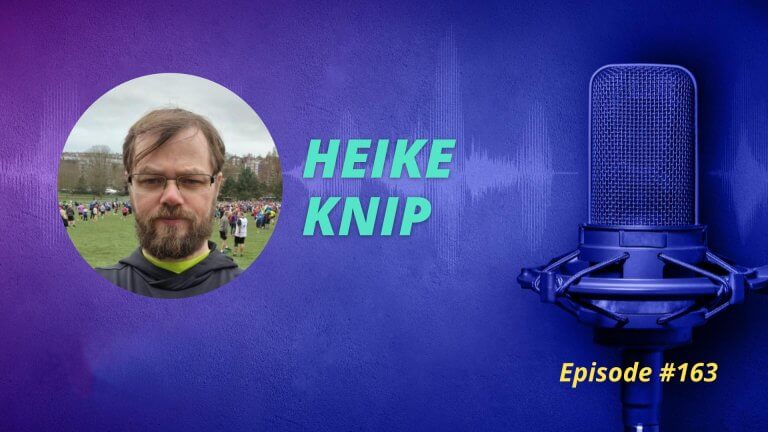In Search Podcast: Why Being Neurodivergent Shouldn’t Stop You From Being a Top SEO

What exactly does being neurodivergent mean? And how does it impact someone’s role as an SEO? And how can you better assist someone who’s neurodivergent in your team?
That’s what we’re covering today with a man who recently ran the Brighton marathon. He’s passionate about using his neurodivergence to his advantage. And he specializes in on-site and technical SEO. A warm welcome to the In Search SEO podcast, the founder of The Good SEO company, Heike Knip.
In this episode, Heike shares how why being neurodivergent shouldn’t stop you from being a top SEO:
- What does being neurodivergent mean?
- Examples of not asking a neurodivergent person the right way
- How to help a neurodivergent person work with a team
- How recruiters can give neurodivergent people a fair opportunity
Heike: Thank you for having me and I’m happy to join the show.
D: Thank you so much for coming on. You can find Heike over at thegoodseocompany.com. I love that brand, how did you come up with that?
H: It’s quite simple. I looked around and when I saw the name, strangely nobody ever took it.
D: It’s strange, you would think that certain domains that you absolutely love will be taken but when you find out they’re available that’s incredible.
So let’s get into the core topic. What exactly does being neurodivergent mean?
1. What Does Being Neurodivergent Mean?
H: There are multiple conditions and you can have one of them. You can be autistic, have ADHD, dyslexia, or a combination of them. But you have also things like bipolar, OCD, and other conditions that fall under that. And normally, I like to use the term neurodivergent because most people have one of them, but nobody has also one of the other ones. So I didn’t always need it. More studies are showing that autism and ADHD are more interlinked than people thought before. Because most of the people that have been diagnosed in the past are being diagnosed with either of them. As for myself, I have both of them. I’m in the process of getting my ADHD assessment and unfortunately, there’s a waiting list of 15 years in the UK. The way they assess things is still based on traditional methods that are not suitable anymore for these days but that’s a whole different story.
D: So you’re also a neurodiversity trainer as well.
H: I can explain what are the benefits and the pluses. For example, in SEO it can be quite beneficial to have someone with neurodiversity because one of the things they can help with if, for example, you have ADHD, you’re a really good problem solver. You’re really good at looking outside of the box. Most people that are neurodiversity are creative people. Because if you look within, let’s say, the creative industry, a big part, not all, of the people there were treated for neurodiversity because we think outside of the box, we think wilder.
I love problems, that’s why I love SEO. Somebody comes to me with a problem and I find the solution. So I have to look at 110 different things at the same time to see how we can have it solved and how we can help. We have to look at what is the issue. How can we improve it? Where are the benefits? How can this improve the productivity of your company? Because one of the things that I say is that if you correctly communicate with them that will be much more efficient. If you have clear communication, that will work.
D: Okay, you’ve talked about a lot there. You mentioned that it can actually be helpful to your role. But also you touched upon the fact that if someone’s not asked the right way, then perhaps it can be challenging. What are examples of not being asked the right way and someone with neurodivergence either not getting or being uncomfortable with the way they’re asked?
2. Examples of Not Asking a Neurodivergent Person the Right Way
H: Communication for each person is different. I’ll use myself as an example. I like direct communication, to be clear and precise. In the UK, sometimes you want to be polite so you talk around the subject. That’s not beneficial especially if somebody is neurodivergent. We like to have information directly. It’s not one rule fits all. It is really unique per person because it depends on where you are on the spectrum. It depends on how you’re happy to communicate. If someone has autism, people will think he doesn’t want to socialize, which is wrong. There are many people that are autistic who like to socialize. But it needs to be in certain settings. It really has to do with communication and I can’t stress that enough.
D: Absolutely. I’m natively British and I can openly criticize British people. And I think in general, British people are fairly poor at getting to the point, being definitive in terms of what they’re saying, and using a little bit too much flowery language sometimes in the hope that people understand the feeling underneath what they’re trying to request, as opposed to being definitive in their request. And I find it important to be more definitive, certainly around people who don’t have English as a first language. I’m around people like that quite a lot. And if you’re not definitive in how you’re articulating your request, then people find it challenging to understand you. Is that comparison between people who maybe don’t have English as a first language and don’t fully appreciate or understand the intricacies behind the language, is that similar to people the challenges that people face who have autism, or is it not a reasonable comparison?
H: I think it is a reasonable comparison. It’s also with nationalities. In the Netherlands, we’re quite direct. Yes is yes, and no is no. And if you have clear communication within a company, your whole team benefits from it. So even aside from the neurodiversity, I think communication, in general, is quite good. Somebody once said to me that the only people that are more direct than the Dutch are the Australians.
D: If an SEO manager has a fairly diverse team, perhaps someone’s neurodivergent on there as well, or people that are different preferred communication styles, what’s maybe the best way to get the most out of those people and to have those team members enjoy being part of the team? For example, should they have a conversation with them initially about their preferred communication style?
3. How to Help a Neurodivergent Person Work Together With a Team
H: Definitely. As I said, everybody has a different way on they prefer to work, and how best they fit within a team. It can be some people that are great in SEO, but they can’t work in a team in an office space. Whereas you can have a look what kind of additional support you can give around that. I know somebody who is creating code but he doesn’t want to pick up the phone or anything. He just wants to be talked to by email. Yes, you need to sit down with everybody, have a look at they support they need, and how they want to communicate.
In terms of support, if somebody is on the autistic or ADHD spectrum, and they have a meltdown or overstimulation, when sometimes it gets a bit too much, what is the protocol? Is there a quiet room so they can go sit down for 10-15 minutes to calm down? There’s a whole conversation behind it on how best to put it in there. But I’d say, especially with SEO, I think all those additional things which you can do outweigh by far the positive things that people with neurodiversity can bring into an SEO team just because of their different way of looking at things and also finding new solutions to it.
Also, for anybody listening, if the employer says it is a money issue, there is within the government the Access to Work scheme. And this is funding for up to 66,000 pounds a year at the moment. I believe next year, it will go up to 67,000. And that is for the purpose of keeping people within the company. And that can be support from something simple like software. But it can be also as far as getting somebody to support the CAPA Coaching, etc. It can be quite a lot. You won’t get 66K all of all the time, but it can often that depending on the niche.
D: Yeah, I think that’s important to think about. Obviously, that’s a UK example that you’ve given but I think most countries around the world will have some kind of additional support for neurodivergent people. Other people that have different disabilities or other challenges that want to work but maybe can’t work in a completely conventional way as part of a team. So perhaps there’s a budget available for someone to be an assistant or as you mentioned, software as well. Great point there as well.
I want to mention another point. While you were talking previously, I was thinking about the fact that maybe as a team leader, many SEOs managers, if they got a team of six or twelve SEOs, once a week, get that team together and maybe get each individual to contribute and share things. And perhaps that’s not an entirely fair way to do things if people feel under stress or under pressure to talk in public as part of the team. And maybe that manager needs to have a think about other ways to let those individuals contribute and articulate their views perhaps on an individual basis instead of publicly like that. But that was more of a common error for myself.
I just want to cover one more topic, and that is recruitment. Now, you touched upon the fact that maybe budget could be available, but as part of the recruitment process, maybe the questions that people are asked, is there anything that interviewers can do to give people like this a more fair opportunity?
4. How Recruiters Can Give Neurodivergent People a Fair Opportunity
H: Oh, most definitely. There are a lot of things in the recruitment sector that can be done. The biggest thing is at the moment is that 78% of people that are autistic, in the latest data that I read, said that they are unemployed. But a good chunk of it is not that they don’t want to work but that they’re not getting hired. Another statistic that was done that day on the managers that hire, 50% of the managers won’t hire somebody who’s neurodivergent just because of the idea that they don’t know.
This is a whole topic in itself. There’s a lot that needs to change. The questioning and the way we do interviews. For me, if I go and apply for jobs, it’s not that I need so much extra time, and some people as it is necessary for them, but for me, it is more difficult sometimes to answer the questions. Sometimes you get these case studies of Walt and Harry is having a fight over the water cooler. And they’ll ask what are you going to do there. And for me, the questions start popping in like, Why are they fighting? Are they raising their voice? Are they punching each other? For me, again, I need clear communication. They need to simplify it a little bit. Harry is speaking angrily at Bob about what happened last weekend. That’s more clear. And then I can say that something happened during this session at work on the weekend and I’ll report this to the manager or whatever the protocol is.
Also, the way how it needs to be communicated. One thing to also remember with people with ADHD, especially with autism, is you can get quite overwhelmed with forms, especially if there are a lot of questions. Especially with me with ADHD, sometimes, on a personal level, not on the business level, not with my clients, it’s prioritizing what’s the most important is difficult. So if I see a lot of questions, I already go switch off and that’s it.
D: This is a thought-provoking conversation. It’s by no means a comprehensive coverage of what managers and leaders need to think of in an organization but hopefully, it’s a starting point for people to become a little bit more aware of the issue. And it gives people an opportunity to start researching a little bit more, considering their communication, and considering their processes and how they can give people with neuro divergence a greater opportunity or a more equal opportunity with other people out there. So thanks for sharing that with us.
Let’s finish off with the Pareto pickle. Pareto says that you can get 80% of your results from 20% of your efforts. What’s one SEO activity that you would recommend that provides incredible results from modest levels of effort?
The Pareto Pickle – Create Great Content
H: I always say having good content. Content is normally always the most important one. One of the examples that I always use is a client who has a website for cookery courses and by doing some simple updates within her cookery courses on her website, she’s at the moment dominating the first, second, and third positions all over the internet. It could be her competitors are not using an SEO company, but it shows what can be done even with small little tweaks. By simply providing good-quality content on the website that answers the questions of people online made a big impact. And this was maybe a couple of hours of work but it had a big impact on the whole scene. And they’re still there so that’s a good thing.
D: Absolutely. I’ve been your host David Bain. You can find Heike Knip over at thegoodseocompany.com. Thanks so much for being on the In Search SEO podcast.
H: You’re more than welcome and I really enjoyed it.
D: And thank you for listening. Check out all the previous episodes and sign up for a free trial of the Rank Ranger platform over at rankranger.com.
The #1 keyword research tool
Give it a try or talk to our marketing team — don’t worry, it’s free!







